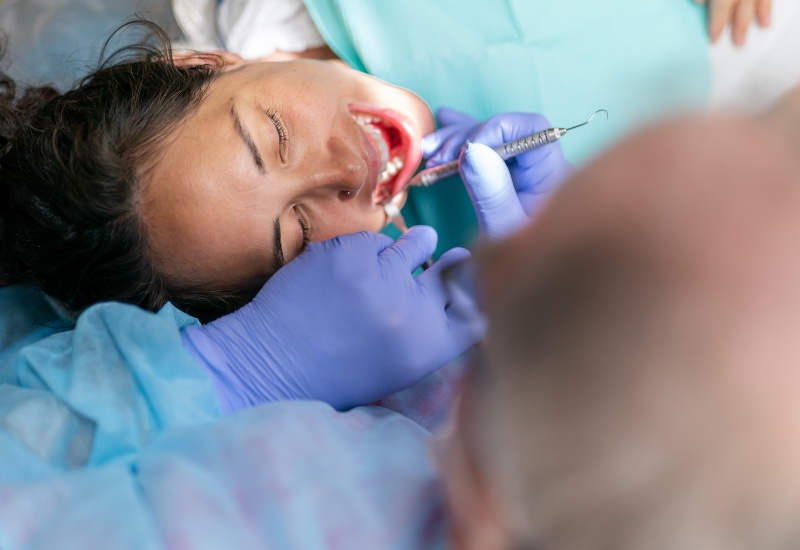Periodontal Disease
Periodontal Disease Treatment in St. Charles & Glen Ellyn, IL
At Family Dental Care, we emphasize not only the health of your teeth but also the health of the gums and supporting tissues. We offer comprehensive periodontal disease evaluation, prevention, and treatment in St. Charles and Glen Ellyn, IL. Untreated gum disease can lead to tissue and bone loss, tooth mobility, and even tooth loss, so early detection and care are key.

What Is Periodontal Disease?
Periodontal disease, commonly called gum disease, is an inflammatory condition affecting the gums and the structures around your teeth. Bacteria in dental plaque that accumulates near the gumline can irritate tissues, leading to inflammation. If this plaque hardens into tartar, the bacteria drive deeper infection that attacks the gums, periodontal ligaments, and jawbone.
The Stages of Periodontal Disease
The first stage of periodontal disease is called gingivitis. This stage is often marked by inflammation of the gums, which may appear puffy or darker red than normal. You may also experience bleeding when flossing or brushing your teeth.
The second stage of periodontal disease is periodontitis. During this stage, the gums begin to pull away from the teeth, causing them to look elongated. Patients often experience tooth sensitivity when this occurs as well.
The third and final stage of periodontal disease is advanced periodontitis. By this stage, the gums, periodontal ligaments, and bone of the jaws have been affected by the infection, compromising the stability of your teeth. The teeth may become loose, shift, or fall out if dental treatment is not sought.

The Stages of Periodontal Disease
Gum disease progresses through stages and recognizing which stage you are in helps guide the right treatment. The stages are:
- Gingivitis – This is the earliest, mild form. Gums become red, swollen, tender, and bleed when brushing or flossing. Bone and connective tissue are not yet affected. In many cases, early periodontal disease is fully reversible.
- Early/Moderate Periodontitis – As the disease advances, the gums pull away from teeth, forming pockets that trap bacteria. Bone loss begins, and greater damage to deeper structures occurs. Pockets deepen beyond what routine cleaning can manage.
- Advanced Periodontitis – At this stage, gum tissue, bone, and ligaments are severely damaged. Teeth may loosen or shift. Unless treated, teeth may be lost.
Types of Periodontal Disease
Periodontal disease can take various forms. The types of periodontal disease include:
- Chronic Periodontitis – The most common type, gradually progressing over years, often related to long-term plaque accumulation and poor oral hygiene.
- Aggressive Periodontitis – A more rapid form affecting younger patients, often with a genetic predisposition or heightened bacterial virulence.
- Localized vs. Generalized Periodontitis – Localized means only a few teeth or areas are involved; generalized means widespread involvement across the mouth.
- Necrotizing Periodontal Disease – A severe, rapidly destructive form where tissues die (necrosis); often associated with systemic illness or a compromised immune system.
Our Periodontic Services & Treatments
At Family Dental Care, our periodontal services are designed to tackle disease at every level. Our team knows how to treat periodontal disease with:
- Comprehensive periodontal evaluation and charting
- Scaling and root planing (deep cleaning)
- Antibiotic/antimicrobial therapy
- Flap/pocket reduction surgery (osseous surgery)
- Gum grafting/soft tissue grafts
- Bone grafting and regenerative procedures
- Maintenance and periodontal recall
Prevention & Treatment of Periodontal Disease
Prevention and early intervention are the bedrock of periodontal health. At Family Dental Care, we emphasize:
- Daily oral hygiene
- Regular dental checkups and cleanings
- Lifestyle risk control
- Timely professional treatment
- Ongoing maintenance
The Benefits of Treating Periodontal Disease
Treating gum disease yields many positive outcomes. Early and appropriate treatment prevents further bone and tissue loss, maintaining the support structure of teeth. Stabilizing tissues helps keep your natural teeth in place. Healthier gums reduce inflammation, swelling, and exposure of root surfaces, improving your smile. You will have fresher breath and a lower risk of infections. Managing periodontal infection helps reduce the inflammatory burden on your body, which may benefit heart disease, diabetes control, and other conditions. Preventing severe disease is less costly and less invasive than treating advanced damage or replacing lost teeth.
Why Choose Family Dental Care?
Serving St. Charles and Glen Ellyn, we make periodontal services accessible to local communities. We are proud to offer expert treatment to our patients, with benefits including:
- Integrated, Follow-Through Care – From diagnosis to maintenance, you’ll stay with our team. No need for multiple referrals unless your case demands it.
- Experienced Clinicians – Our dentists and hygienists are skilled in periodontal assessment, treatment, and patient education.
- Advanced Diagnostic Tools – We utilize probing, imaging, charting, and reliable measurement to track disease and tailor treatment plans.
- Personalized Treatment Plans – We consider your medical history, risk factors, and goals to select the most appropriate, evidence-based therapies.
- Commitment to Prevention – Our goal is not just treatment, but ongoing health and stability through maintenance and patient education.
Call to Speak to Our Periodontal Disease Dentist
Don’t let gum problems escalate. If you’ve noticed bleeding, swelling, gum recession, or loose teeth, or if it’s been a while since your last exam, contact our St. Charles or Glen Ellyn office today to schedule a periodontal evaluation. Let us help you restore gum health and protect your smile for years to come.
FAQs
Questions about periodontal disease are common, so we have assembled some frequently asked questions for our patients. Let us know if you have further questions:
In the gingivitis stage, yes, with proper hygiene and cleaning. Once bone and tissue are lost, the process isn’t fully reversible, but it can often be stopped or managed.
We use a periodontal probe to measure pocket depths, chart gum attachment, look for bleeding or recession, and may take X-rays to assess bone loss.
Procedures like scaling and root planing are done under local anesthesia and are generally well tolerated. Surgical procedures may cause more discomfort, but we manage this with anesthesia, sedation, and post-operative care.
After active treatment, patients commonly return every 3–4 months for maintenance to control bacterial repopulation and keep the disease in check.
Conditions like diabetes, cardiovascular disease, smoking, or immune disorders can influence disease progression and healing. We assess your overall health when designing your treatment plan.
It’s mainly caused by plaque, a sticky film of bacteria that hardens into tartar and irritates the gums.
